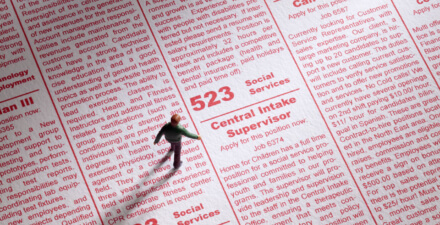A new report lays out the path forward for faltering U.S. Unemployment Insurance system

Today, experts from seven organizations released a fortuitously timed report charting a path forward for the U.S. Unemployment Insurance program. Unemployment Insurance is the main social insurance program designed to provide income replacement to people who lose work through no fault of their own. When unemployed people spend UI dollars to make ends meet, they stabilize the U.S. macroeconomy because their spending keeps businesses afloat.
Research shows a host of benefits that come with the provision of Unemployment Insurance. It allows Black and Latino workers—who typically lack savings cushions due to structural racism in our schools, housing markets, and other institutions—to pay for the expenses they incur. It improves health and well-being. It allows workers to take the time they need to search for a job that is a good match for their skills, which leads to higher pay for workers and better matches for employers.
Yet the Unemployment Insurance program has been plagued by serious problems for decades. It is underfinanced, which leads to benefit amounts that are too low, benefit durations that are too short, and enrollment processes that are confusing and cumbersome. The eligibility criteria do not reflect the realities of today’s labor market, so some people who lose work through no fault of their own are not eligible to receive benefits. These shortcomings disproportionately affect women and people of color who are more likely to be relegated to low-paying jobs, to have caregiving responsibilities, and to face discrimination in the labor market.
States are now taking unprecedented action that further erodes the strength of the program. More than 25 governors have announced that they will prematurely cut off workers in their states from the federal pandemic unemployment programs that extended benefit length, increased its amount, and made it available to workers who are outside the scope of the traditional program-eligibility guidelines. These enhancements were set to expire in September, but state governors, acting largely along political party lines, acted to preemptively cut benefits short. These choices, unfortunately driven by politics rather than economics, will leave workers in many states without any income from Unemployment Insurance and will suck billions of dollars out of the U.S. economy.
It’s important to note that the actions of these governors rest on unproven claims that providing support to unemployed workers hurts labor market recovery. The analyses that back these claims ignore the important role that Unemployment Insurance plays in facilitating a truly strong recovery and sidestep addressing important reasons that workers may not be ready to report to worksites, such as continuing health concerns, eroding transportation infrastructure, and lack of affordable child care options.
When state policymakers cut UI benefits short, they undermine both the federal government’s ability to conduct effective fiscal policy and the integrity of the UI program. Federal policymakers must act quickly to ensure that the program is not only preserved, but also strengthened.
Today’s report provides a roadmap to developing a nationally uniform UI program with benefit levels and durations that are responsive to economic conditions. That’s important to prevent policymakers from continuing to rely on Band-Aid programs in moments of economic crisis, which leaves the U.S. economy vulnerable to politically motivated actions at the state level that undercut fiscal policy at the federal level.
The new report also offers a path to ensuring that all members of the contemporary workforce who lose work through no fault of their own are eligible for benefits. And perhaps most exciting, it lays out a blueprint for fixing the financing problems that underlie so many of the issues that plague the UI system.
Developed collaboratively by UI policy experts and the unemployed people most directly affected by the unemployment system’s shortcomings, this report charts a path forward by drawing on lessons learned during the most recent economic crisis. You can read it here.







